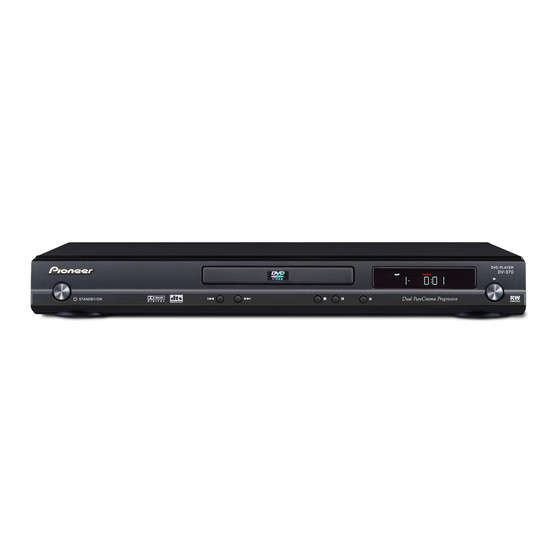Pioneer DV-470 Instrukcja obsługi - Strona 6
Przeglądaj online lub pobierz pdf Instrukcja obsługi dla Odtwarzacz DVD Pioneer DV-470. Pioneer DV-470 44 stron.
Również dla Pioneer DV-470: Instrukcja obsługi (28 strony)

08
Additional
Glossary
40 ページ 2004年3月24日 水曜日 午後6時37分
Analog audio Direct representation of sound by an
Aspect ratio
Digital audio Indirect representation of sound using
Dolby
*1
Digital
languages using the
24日 水曜日 午後6時37分
1
code list
anguage options (such as 'DVD
( ( ( (
WMA) DRM (Digital Rights Management) copy
DRM
he Setup Navigator) allow you to
ed language from any of the 136
ed in the language code list on
her Language'.
(cursor left/right) buttons
er a code letter or a code
*2
Widescreen TV users
eaning
DTS
Settings me
37分
before
(cursor up/down) buttons
If you have a widescreen TV, the TV Screen
arks on
de letter or a code number.
setting (page 33) of this player should be set to
pens,
code list on page 41 for a
16:9 (Wide) .
of languages and codes.
When you watch discs recorded in 4:3 format,
EXIF
you can use the TV controls to select how the
(Exchangeabl
e Image File)
picture is presented. Your TV may offer various
zoom and stretch options; see the instructions
ome dirty
that came with your TV for details.
t should
ult your
Please note that some movie aspect ratios are
File
nter. We
wider than 16:9, so even though you have a
extension
ly
widescreen TV, these discs will still play in a
'Display'.
.
'letter box' style with black bars at the top and
t registration code is displayed.
ISO 9660
bottom of the screen.
format
ettings
JPEG
Standard TV users
yer if it is
Out
DivX VOD Registration Code
de, or if
42
If you have a standard TV, the TV Screen
ckly.
0 1 2 3 4 5 6 7
setting (page 33) of this player should be set to
mage the
4:3 (Letter Box) or 4:3 (Pan&Scan) ,
depending on which you prefer.
warmer
Set to 4:3 (Letter Box) , widescreen discs are
Downloaded From Disc-Player.com Pioneer Manuals
En
shown with black bars top and bottom.
e of the code as you will need it
electrical signal. See also Digital audio.
The width of a TV screen relative to its
height. Conventional TVs are 4:3;
widescreen models are 16:9.
numbers. See also Sampling frequency
and Analog audio.
A multi-channel audio encoding system
developed by Dolby Laboratories that
enables far more audio to be stored on a
disc than PCM encoding. See also PCM
(Pulse Code Modulation).
protection is a technology designed to
prevent unauthorized copying by
restricting playback, etc. of material on
devices other the PC (or other WMA
recording equipment) used to record it.
For detailed information, please see the
instruction manuals or help files that
came with your PC (or other WMA
recording equipment) and/or software.
A multi-channel audio encoding system
developed by Digital Theater Systems
that enables far more audio to be stored
on a disc than PCM encoding. See also
PCM (Pulse Code Modulation) .
A file format developed by Fuji Photo
Film for digital still cameras. Digital
cameras from various manuafcturers
use this compressed file format which
carries date, time and thumbnail
information, as well as the picture data.
A tag added to the end of a filename to
indicate the type of file. For example,
".mp3" indicates an MP3 file.
International standard for the volume
and file structure of CD-ROM discs.
A standard file format used for still
images. JPEG files are identified by the
file extension ".jpg".
MP3
MP3 (MPEG1 audio layer 3) is a
compressed stereo audio file format.
Files are recognized by their file
extension ".mp3".
MPEG audio
An audio format used on Video CD/
Super VCDs and some DVD discs.
PBC
A system of navigating a Video CD/
(PlayBack
Super VCD through on-screen menus
Control)
recorded onto the disc.
PCM
Digital audio encoding system found on
(Pulse Code
CDs. Good quality, but requires a lot of
Modulation)
data compared to Dolby Digital, DTS
and MPEG encoded audio. See also
Digital audio .
Progressive
All the lines that make up a video
scan video
picture are updated in one pass
(compared to interlace which takes two
passes to update the whole picture).
Regions
These associate DVD-Video discs and
players with particular areas of the
world. See DVD-Video regions on
page 39 for more information.
Sampling
The rate at which sound is measured to
frequency
be turned into digital audio data. The
higher the rate, the better the sound
quality. CD is 44.1 kHz; DVD can be up
to 96 kHz. See also Digital audio .
WMA
WMA is short for Windows Media Audio
and refers to an audio compression
technology developed by Microsoft
Corporation. Files are recognized by
their file extension ".wma".
Microsoft, Windows Media, and the
Windows logo are trademarks, or
registered trademarks of Microsoft
Corporation in the United States and/or
other countries.
*1
Manufactured under license from Dolby
Laboratories. "Dolby" and the double-D symbol
are trademarks of Dolby Laboratories.
*2
"DTS" and "DTS Digital Surround" are
registered trademarks of Digital Theater
Systems, Inc.
